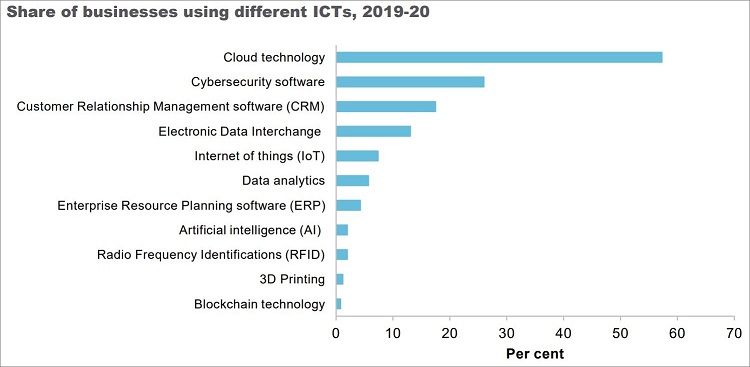Australian businesses are continuing to fall behind on technology adoption, especially when it comes to data analytics and artificial intelligence, an interim Productivity Commission report into Australia’s data and digital dividend has found.
When stacked up against OECD countries, Australian businesses performs fine when it comes to basic internet connectivity and cloud adoption but is at the bottom of the pile for data and AI.
“Technologies such as artificial intelligence, robotic automation and big data analytics could revolutionise how businesses operate and help lift Australia’s productivity growth by reducing costs, improving the quality of goods and services, and increasing product choice for consumers,” Productivity Commissioner Dr Stephen King said in a statement.
“Digital technology and data will continue to shape global economic growth and social change in coming years.
“Whether we fully realise the productivity dividend offered by these opportunities will depend on how effectively governments, businesses and individuals can recognise and safely harness these changes for Australia’s benefit.”
Less than 10 per cent of businesses in Australia use data analytics technologies – it’s closer to 30 per cent in the Netherlands, Denmark, and the UK – while around five per cent are using some form of AI.
Topping the list of technologies used by local business is anything in the cloud, which some 60 per cent of companies said they were using.
Next came cyber security software and customer relationship management (CRM) software like Salesforce.
Proportion of Australian businesses adopting various technologies. Image: Productivity Commission
The proportion of businesses self-reporting that they use cyber security software is surprisingly small, just 30 per cent, and suggests a measurement of dedicated cyber tools or vendor-specific software and not default security features like Windows Defender.
Likewise, the self-reported nature of data used in the Productivity Commission’s research – largely gleamed from the Australian Bureau of Statistics’ Business Characteristics stream – means the use of AI might be somewhat underreported as well because of AI in third-party software that companies didn’t include when asked about AI use.
While this is just an interim report, it does hint at what recommendations the Commission will make, including a mandated service guarantees that would improve access to high quality internet in regional and remote Australia.
It is also considering a recommendation that would see greater access to government-held data – including My Health Record – in order to find extra economic benefits.
Improving digital skills and cyber security in businesses are other areas of interest for the Productivity Commission, along with questions around the ethical use of technology and broader regulatory environment.
Submissions to the Productivity Commission about its interim report are open until Friday, 7 October, and can be made on the Commission’s website.











